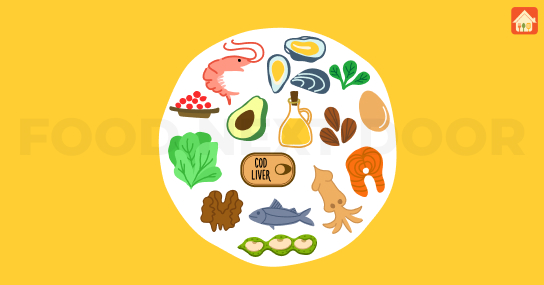
In the country, over 16% of women between the ages of 20 and 29 suffer from PCOS/PCOD. By changing their diet and lifestyle choices, many women with PCOS or PCOD have been able to manage their symptoms and lower their chance of developing medical problems.
A hormonal imbalance disorder is known as Polycystic Ovary Syndrome (PCOS) or Polycystic Ovarian Disease (PCOD). According to the findings of a recent national survey, over 16% of women in the age group of 20-29 years suffer from PCOS/PCOD. It’s usually identified by irregular periods or a complete lack of menstruation. Multiple cysts in the ovaries are common in this disorder, which is caused by an excess of androgens in the body. Many people are overweight, which leads to difficulties. In dealing with this hormonal issue and losing weight, lifestyle and nutritional changes can be extremely beneficial. If the symptoms are not managed, the woman’s chance of developing heart disease, endometrial cancer, Type II diabetes, and high blood pressure rises, affecting her fertility and perhaps causing difficulties during pregnancy.
By changing their healthy diet and lifestyle choices, many women with PCOS or PCOD have been able to manage their symptoms and lower their chance of developing medical problems. These easy lifestyle changes can also help you improve your general health while lowering anxiety, which can have a big impact on your ability to conceive.
Here are 5 foods that women with PCOS/PCOD should incorporate into their diet:
Leafy Greens

A woman’s diet should include at least 1-2 servings of healthful, nutritious green leafy vegetables. These are not only nutrient-dense, but they’re also high in Vitamin B. It’s a vital nutrient that helps with fertility by regulating ovulation, insulin regulation, and bodily blood flow. As a result, a high vitamin B consumption can aid in the management of PCOS symptoms. It may also aid in the reduction of hair thinning and hirsutism (excess hair growth), two common PCOS and PCOD symptoms.
Omega-3 fatty acids

Omega-3 fatty acids are an important nutrient that can aid in the correction of hormonal abnormalities. Salmon and sardines, for example, are high in Omega-3. Omega-3 also aids in stress management and inflammation reduction, both of which can lead to excessive weight gain. Fish oil supplements can be administered if these fish are not available. Flax seeds or walnuts can be used in yoghurt or smoothies by vegetarians.
Legumes

High in fibre and protein, legumes such as chickpeas, beans, lentils, peas, and soybeans have no cholesterol. Because of their low glycemic index, legumes are good for diabetes control because they help to regulate blood sugar after eating. They’re also high in protein and can be eaten on their own, as a side dish, or as part of salads, wraps, or tacos.
Berries

Berries are high in antioxidants, which may help lower oxidative stress in PCOS patients. Berries include polyphenols, which have been demonstrated to aid in weight loss, diabetic management, and indigestion relief. Strawberry and blueberry mixtures can be taken with yoghurt for added advantages.
Oats

Oats contain soluble and insoluble fibre that inhibit fat and sugar absorption in the body. Oats also contain vitamin B, which aids in the creation of the hormone progesterone. Oats include zinc, which can help with hair growth and PCOS reversal.
A diet rich in fruits and vegetables keeps women satisfied for longer while also allowing them to consume fewer calories. It also aids in lowering the risk or severity of heart disease. Women who follow a low-carbohydrate or a low-GI diet have improved insulin metabolism and lower cholesterol levels. The online homemade food delivery provides the best services to help in PCOS Diet.
A good diet can have a significant impact on our bodies, and people diagnosed with PCOS can benefit from it.
The PCOS patients eat homemade food for better health.
Consume more fibre foods: Fibre-rich foods aid in blood sugar regulation, inflammation reduction, and digestive health. Whole grains, beans including lentils, nuts, fruits and vegetables are all high in fibre. A high-fibre diet may help women with PCOS lose weight because it helps them feel full faster. In persons with PCOS, a high-fibre diet has been shown to help reduce insulin resistance, body weight, and extra body fat. Homemade food services is available in many cities.
Eat a lot of lean protein: Protein helps to keep blood sugar levels stable and increases feelings of fullness after a meal. It also aids weight loss by reducing hunger, increasing calorie burn, and regulating hunger hormones. Weight loss is aided by increased protein consumption, especially in PCOS women. Nutritious, high-protein meals like eggs, almonds, and seafood should be incorporated into the diet. The homemade food products are equipped with protein.
Antioxidant-rich foods:Antioxidant-rich meals can help you manage your insulin levels and prevent inflammation. Antioxidants are abundant in fresh fruits and vegetables, nuts, and whole grains.
Limit your intake of refined carbohydrates and saturated fats: Sugar, processed foods, food packages, fast foods, refined wheat, fruit juices of all types, soda, aerated beverages, and ice cream are all refined carbohydrates that should be avoided. The most important factor is to maintain a proper protein-to-carbohydrate ratio. Fats: Carbohydrates Due to the influence of carbs on insulin levels, a low-carbohydrate diet aids in PCOS control. A low-glycemic diet may help women with PCOS.
Dairy consumption is reduced: Some people with PCOS find that limiting dairy consumption helps them lose weight and improve some of their hormonal PCOS symptoms with the cunsumption of healthy homemade food. Reduced dairy consumption also improves intestinal health and aids nutrient absorption for many women.
Weight loss or weight management can help alleviate PCOS symptoms. Weight loss might help the ovaries regain their normal function and hormone production. As a result, PCOS symptoms such as excessive facial or body hair growth, acne, scalp hair loss, and monthly irregularity may improve. Women with PCOS/PCOD should also seek medical counsel, particularly if they are using fertility medications to make up for the nutrients they are missing in their regular diet. Women with PCOS/PCOD often find it difficult to manage their stress. Long-term stress, on the other hand, can have a negative effect on hormones and fertility. However, numerous studies have found a link between high-stress levels and infertility. The hormone cortisol is released in response to high amounts of stress. Affected women can use meditation, exercise, yoga, or counselling to better control their stress.
